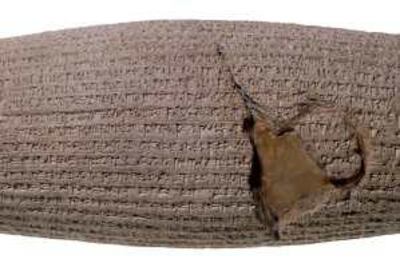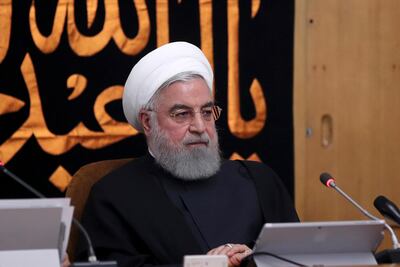The stated policy of the current US administration in Washington has been to exert "maximum pressure" on the Iranian government until the nation agrees to act like a normal country.
Both Mike Pompeo, the secretary of state, and Mark Esper, the defence secretary, have used the term in recent weeks. "They need to change, they need to become a normal country," Mr Pompeo said during a visit to Ukraine this month.
Reminders abound that Iran is far from being a place that abides by normal rules and international laws. It is a delusion that is so persistent that it warps successive generations of politicians and diplomats.
Take the example cited last week by Neil MacGregor, the former director of the British Museum, of the impact of Britain lending the Cyrus Cylinder to Iran in 2010.
The clay remnant of a 2,500-year-old political charter was sent back to Iran as a gesture towards restitution between Western cultures and the ancient land where the object was found. The boffins at the museum expected the loan to throw up a narrative of how Iran had asserted the rights of the weaker nations by securing its return, even if the loan was temporary.
Instead, Iranians became embroiled in a row over the celebration of its ancient pre-Islamic culture. The Cyrus Cylinder was in effect unwanted in its own land. Protesters mobbed the national museum. Hardliners denounced the exhibition.

Azadeh Ardakani, the director of the museum, was arrested and sent to the fearsome Evin Prison, a fate shared by many thousands who are targeted by the regime in charge of the Islamic Republic.
As the antiquity of the Cyrus Cylinder demonstrates, Iran has a fascinating historical culture. I am indebted to the outfit Political Tours for a photograph of graffiti on a palace at Persepolis left there by the famed 19th century writer Henry Morton Stanley.
A short blurb on the Instagram post adds that the inscription explains an embedded sense of victimhood in the national psyche. “The graffiti is also emblematic as Iran sees itself as being unfairly dominated or interfered with by outsiders,” it said.
Be that as it may, I don’t intend here to re-litigate the past 3,000 years. Instead, it is reasonable to observe that Iran is perfectly happy to exploit that foreign fascination with its history for present-day goals.
Take the treatment of the British-Australian blogging couple who have languished in prison as Iran seeks leverage with the US and other Western powers.
They have joined more than a dozen people who are hostages to Iran's foreign policy position. While Iranian diplomats present themselves as hand-wringing impotents in the face of hardliner intransigence, they surely see tactical advantages in holding on to people as bargaining chips.
Starved of oil revenues by sanctions designed to curb its expansionist regional policies and swelling missile arsenals, Iran should be in an emollient mood. Instead, it is belligerent.
Seeking out new victims is only one aspect of its defiance. It has sought to disrupt the international freedom of navigation that is a pillar of global prosperity. It has enshrined its regional aggression into a national doctrine, sometimes referred to as "sacred defence". It is entrenching its revolutionary anti-Western agenda. This not only allows for an expansion of its meddling into other theatres, but also raises the global reach of its anti-Western policies.

In the face of this, foreign governments cannot resist the urge to somehow win over the Iranians. To be a normal country. Paris has set out to find a $15 billion credit line that replaces the lost oil revenues. This mechanism would act as a pivot that would (hopefully) entice Tehran to compromise in areas like the atomic programme, missile development and regional stability.
A similar phase of wishful thinking is engulfing British policy. With a revolving door that is spinning ever faster, the office of British foreign secretary does not carry the weight it once had. Each new face has a habit of coming out with a fresh perspective on the big, thorny international topics.
Dominic Raab, the newest occupant (there have been four incumbents in four years), has said some striking things about Britain wanting to bring Iran in from the cold. It is a phrase with a pleasing ring to it, perhaps something James Bond could be tasked to undertake.
Meanwhile, US President Donald Trump is openly dangling a one-to-one meeting with Iranian counterpart Hassan Rouhani as a means of rehabilitating the regime. The impediments to a meeting have been steadily removed by the US side. Mr Trump dismissed as his national security adviser John Bolton, who opposed the mooted discussions, last week.
The problem is that the idea that Iran wants to change has been tested to destruction for the past 40 years. The lesson remains unlearned and the outcome of Mr Trump’s overtures is unfortunately doomed to failure.

